The importance of oral health during orthodontic treatment

I can’t stress enough the importance of oral health during orthodontic treatment. Oral health is crucial in determining the orthodontic result you achieve with your treatment.
Did you know, healthy gums and clean teeth will promote tooth movement for a better and healthier result? Conversely, poor oral hygiene can lead to gingivitis and gum infection which can slow down the movement of teeth.
I’ve put together helpful information for those in treatment because, looking after your braces and clear aligners as well as your teeth and gums, is really important if you want to achieve the best results.
Why is oral health so important during orthodontic treatment?
The National Oral Health Plan prepared by the National Advisory Committee on Oral Health (The Department of Health) highlights;
“Oral health is fundamental to overall health, well-being and quality of life”
Poor oral health is directly associated with major chronic diseases including diabetes and cardiovascular disease. But what about our teeth health and why is this important during orthodontic treatment?
During orthodontic treatment you may have brackets or other attachments placed on your teeth. Food can easily be trapped in and around these attachments and permanent damage to tooth enamel can occur if the teeth and brackets are not kept clean. This means your risk of tooth decay and gum disease may be higher during treatment.
Gingivitis is an early form of gum disease (periodontal disease) that, left untreated, can lead to tooth loss. It presents as redness and swelling (inflammation) of the gums and occurs when plaque builds up on your teeth along the gum line.
Areas on the enamel surface may begin to lose minerals (the early stage of tooth decay) leaving unsightly white spots, particularly when the attachments are removed.
And keeping our teeth and gums clean will help you steer clear of bad breath (halitosis)!
The good news? The majority of dental diseases are preventable!
Limiting sugar intake
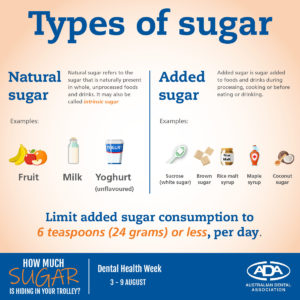
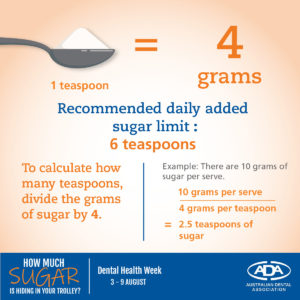
Did you know there are a lot of hidden sugars in the foods we eat every day?
Everything you eat and drink can have an impact of your oral health. Tooth decay is a diet-related disease. The bacteria that live on the surfaces of our teeth process the sugars in our foods into acid, which in turn, draws out the minerals in our teeth. If this process continues without intervention, like practicing good oral hygiene, it can eventually result in tooth decay.
The Australian Dental Association (ADA) recommends limiting our daily sugar consumption with these two key guidelines;
- Consume no more than 6 teaspoons (24 grams) of sugar per day as recommended by the World Health Organisation
- Choose foods with less than 10 grams of sugar per 100 grams.
Did you know that one 600ml bottle of soft drink, on average, contains 16 teaspoons of sugar?!
But it’s not always the soft drinks that are to blame. And sugar is not always a white granule we add to foods and drinks. “Hidden sugars” such as dextrose, fructose (found in fruits and juices), saccharose and syrups are often ingredients in the foods we buy and eat. Even honey!
I encourage you to look at the labels on the products you buy. It is best to look for foods with 5g or less sugar per 100g. Between 5g and 10g is okay also. If a product has over 15g of sugar per 100g, it may be best to find a healthier alternative.
Keep an eye out on our Facebook and Instagram feeds for some great insights and tips to help you navigate “how much sugar is hiding in your trolley?”
The importance of a good diet
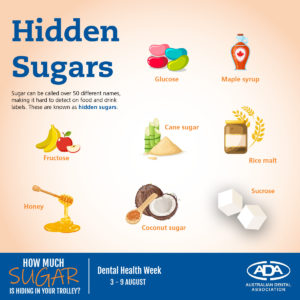
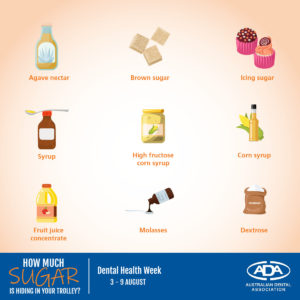
While there’s a lot of discussion around what not to eat, Orthodontics Australia recommends some simple, everyday foods that can build healthier teeth and gums.
Cheese
Bring on the cheese board! Cheese can combat acid erosion of the teeth caused when eating carbohydrates and sugars. Of course, cheese is also a great source of calcium needed to protect your teeth and gums.
Fish
Your body can’t absorb all that calcium from the cheese without vitamin D and fatty fish, like salmon, is a great source.
Oranges
The advice is to stay away from citrus fruit such as lemons as they can cause enamel erosion over time however, the vitamin C in oranges strengthens blood vessels and connective tissue which is great for healthy gums.
Just remember, everything in moderation and try to brush your teeth at least half an hour after consuming.
Water
We know how important water is for our overall health and well-being and our oral health is no different. It’s good for you and its sugar free! Saliva is made up of 99.5% of water! And it’s the body’s natural defence against tooth decay because it breaks down food and neutralises acids. Dehydration thickens your saliva reducing its benefits and, in fact, can be more harmful.
Vegetables
This list is as long as the benefits! Leafy greens are full of vitamins and minerals along with being a great source of calcium. Vitamins A and C are antioxidants, great for healthy gums.
Just remember to stay away from biting into hard foods to avoid damaging your brackets. Foods such as carrots and celery need to be cut into bite-sized pieces.
Green and black tea
Polyphenols, found in green and black tea, suppress the bacteria that causes plaque.
Chocolate
Yes, that’s right! Only the good stuff though! Dark chocolate of at least 70% cacao and, unfortunately, in moderation.
Dark chocolate is often referred to as a superfood and when it comes to our teeth it’s because it contains CBH which can help harden tooth enamel. But remember, it’s all in the cocoa bean, not the chocolate itself!
Practice excellent oral hygiene

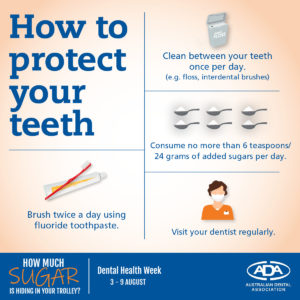
Maintaining good oral health during orthodontic treatment is so important (I can’t stress this enough!). Proper and frequent tooth brushing is crucial whilst wearing braces or clear aligners. The brackets or buttons can trap food and plaque increasing the risk of tooth decay and gum disease.
Here are some simple steps to excellent oral health;
- Use a fluoride toothpaste and a soft toothbrush, brushing your teeth at least twice a day and after any meal or snack
- We know it is a little more difficult to floss when in treatment, so we suggest you try using a floss threader for braces and allowing a little more time
- Interdental brushes are small cylindrical brushes designed to slide into and clean the spaces between the teeth and brackets and are an alternative to flossing
- Drink plenty of water throughout the day
Regular dental check ups
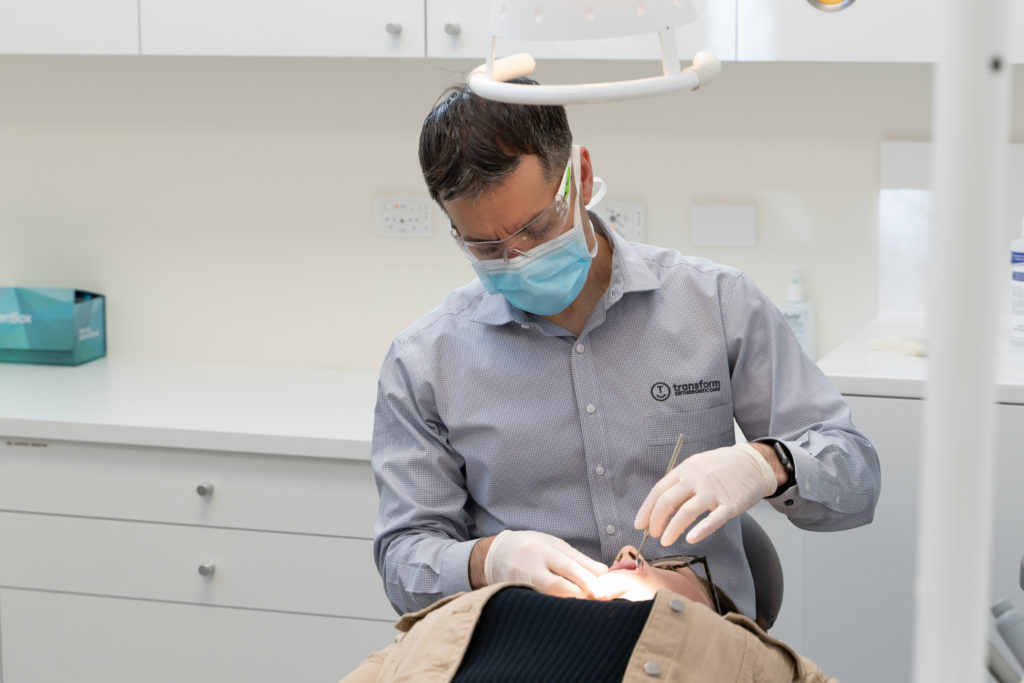
Attending your scheduled orthodontic appointments is really important as well as continuing to use the Dental Monitoring app so I can monitor your treatment and the health of your teeth and gums.
I recommend our patients see their dentist every six months for a check-up and clean while undergoing orthodontic treatment. This will maintain good oral health during the duration of braces or clear aligner treatment. We will even reward you with a movie voucher for doing so! Ask our reception staff for a Dentist Check Up card, get your dentist to sign the card after your check up and show us the card at your next appointment for a movie voucher!
Practicing good oral hygiene, maintaining a low-sugar diet and regular visits to us at TOC and your general dentist you will ensure you achieve the best results and a beautiful, healthy smile.
Until next time,
Keep smiling!


